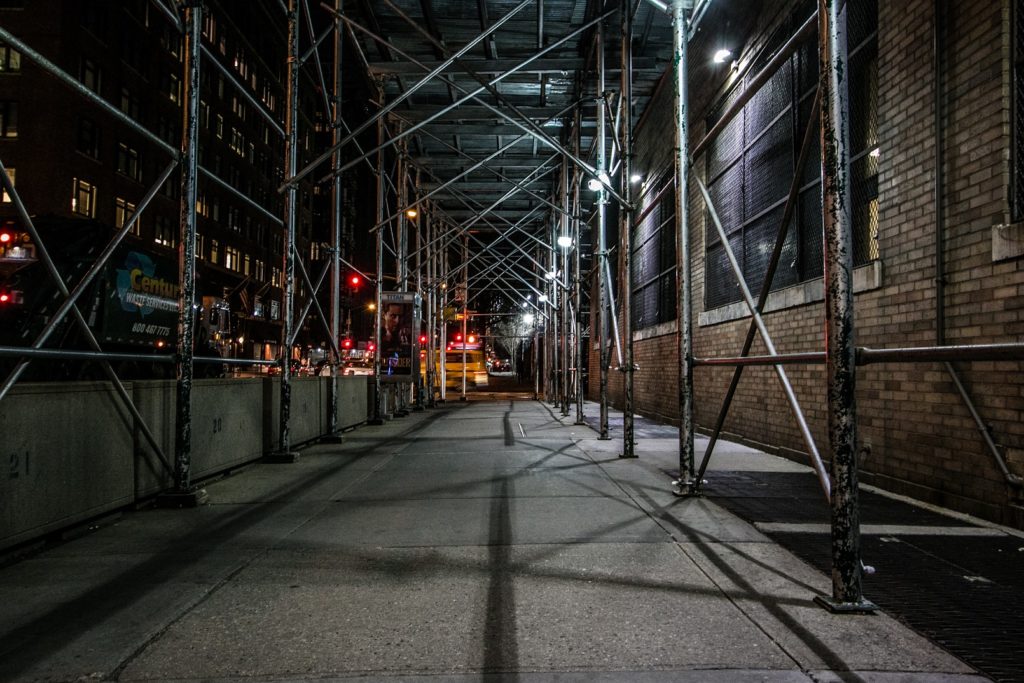
As residents of New York City can attest, construction sites can be found everywhere. In fact, there are an estimated 45,000 active construction sites at any one time in The Big Apple. While this is good for the economy and provides employment for many people, it also creates many hazardous situations.
According to a 2019 Bureau of Labor Statistics (BLS) report, construction consistently rates as New York City’s deadliest industry. BLS data shows that, while construction workers make up only 5% of NYC’s total workforce, they account for 27% of work-related injury fatalities. Statistics also point out that the city’s construction fatality rates are more than five times higher than all NYC industries.
Major Causes of NYC Construction Worker Fatalities
The vast majority of construction worker fatalities can be attributed to falls (58%). Twenty-five percent of the fatal falls were from scaffolds, followed by 16% from ladders and 11% from roofs. The second leading cause of fatality was being hit by, or crushed between, objects like heavy equipment or building materials (32%). In descending order by percentage of frequency, these are the other common causes of accidental construction worker deaths:
• Electrocution
• Poisoning
• Motor vehicle accidents
• Fire/burns
• Saw injuries
• Hypothermia
Many Construction Deaths Are Preventable
What’s particularly troubling about construction accident fatalities is that so many of them are preventable. According to NYC.gov, between 2007 and 2014 there were 159 preventable accidental deaths among construction workers. Occupational Safety and Health Administration (OSHA) investigations into the deaths during this seven-year period found at least one serious safety violation in more than 90% of the fatalities. Some of these violations are pure negligence from oversight or inattention, others are intentional. Construction companies sometimes bid low to get a project, then cut corners to get a job done on time and within budget. Unfortunately, such practices can result in injury and loss of life—not only for construction workers, but for innocent pedestrians as well.
Options for Families of Deceased Construction Workers
If you’ve lost a loved one while they were working on a construction site, you have two possible courses of action under New York State law. You can either pursue death benefits through the deceased’s workers’ compensation insurance, or in a case where negligence is involved, you can file a wrongful death claim. In either case, the guidance of a skilled attorney would be to your benefit.
New York Workers’ Compensation Benefits
Generally, all on-the-job injuries and deaths are eligible for workers’ compensation benefits, provided the injuries were not purposely self-inflicted or a direct result of the worker’s own drug or alcohol use. Since workers’ compensation is no-fault, you don’t have to prove that another party was responsible for the accident. In fact, you may even be able to recover benefits if the worker was at fault.
Wrongful Death Compensation
When negligence is involved in a construction worker’s death—whether on the part of an individual, a property owner, a construction company, a subcontractor, or the manufacturer of defective product—the deceased’s family has the right to sue for compensation for the following damages:
• Funeral and burial expenses.
• Costs of medical care before death.
• Pain and suffering of the deceased before death.
• Loss of income since the date of death, and the loss of income you could reasonably have expected to receive in the future.
• Loss of benefits, such as healthcare and retirement.
• Loss of household services the deceased provided, such as childcare, property maintenance, bookkeeping, etc.
• Emotional losses, such as loss of companionship, guidance, affection, marital consortium, etc.
• Punitive damages in cases of extreme negligence.
While we at Wingate, Russotti, Shapiro, Moses & Halperin, LLP, sincerely hope you never need our services, there may come a time when you do. In such a case, we are eager to answer any questions you may have. For a free consultation, call (212) 986-7353.